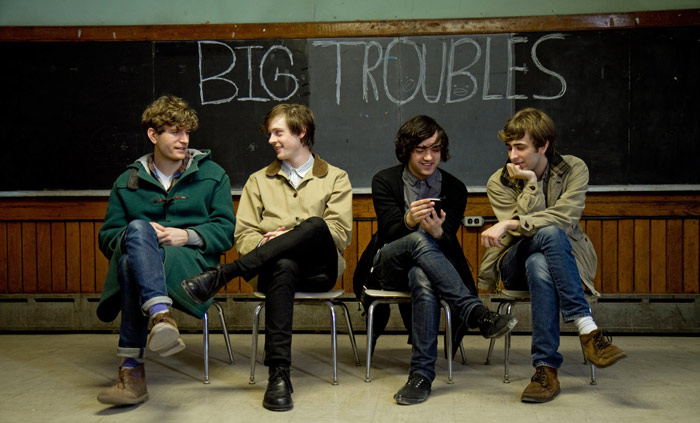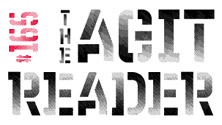
Some Kind of Wonderful
by Kevin J. Elliott
The members of Big Troubles come from a generation with an identity crisis when it comes to influence. The late ’90s and the early ’00s were a wildly divergent time in music. For most, it was a grey area dealing in de-evolution—from high gloss “alternative” radio rock to tattered indie rock and further down the lo-fi abyss. Those transfigurations show up all over Big Troubles’ debut, 2010’s Worry. The album isn’t unsure of itself, as pop melody lies at the heart of their songs, but it is caked with blasts of fuzz, four-track idiosyncrasy, and huge shambolic riffs. With Romantic Comedy, their sophomore effort due out next week, the band took to evolving by refining their sound in a sonically superior studio with no less than Mitch Easter overseeing the sessions. Now, cycles of lush, jangled notes create a dreamy atmosphere, Alex Craig’s voice leads more toward hushed come-ons than youthful immediacy, and overall, any semblance of lo-fi is wiped clean with an illuminating warmth usually reserved for your favorite Smiths or Cure sides.
Coming from Ridgewood, New Jersey, a sleepy suburb which seemingly breeds breezy, effortless, guitar records (see also those by Real Estate), Craig and long-time friend Ian Drennan are certainly part of a second-wave of dream-pop enthusiasts, but Romantic Comedy carves out a unique niche, inspired, as I came to find out from talking to the two of them, by a much more direct source.
I know you guys have known each other since high school, so were there other failed experiments, other bands you played in before arriving at Big Troubles?
Alex Craig: There were plenty, yeah, but not much worth talking about.
Ian Drennan: Big failures actually, nothing that we are proud of.
How exactly did you arrive at Big Troubles? Did one of you start writing songs or was it more a telepathic volley between the two of you?
ID: I think it was more the latter. Alex and I had been writing songs separately from each other leading up to Big Troubles. We eventually decided to combine our songwriting.
AC: We were both away at college in different cities. He was in Boston, and I was in New York. Ian had started a project called Big Troubles, and I started doing stuff on my own that was not unlike what he was doing, so we decided to join forces.
Coming from Ridgewood, New Jersey, there’s been a lot of attention paid to that suburb in recent years (Real Estate, Vivian Girls). Was growing up in that environment more conducive to playing in bands and making music with friends?
AC: Not anymore than any other suburb in America. There wasn’t anything special about Ridgewood, and we didn’t feel connected to any kind of community growing up here. We really started spending more time with the people in those bands around the time that Big Troubles started.
ID: The only connection may have been from watching those musicians who were older than us.
AC: The guys in Titus Andronicus and Real Estate were a bit older than us and they were in bands that we would go see in backyards growing up. But we never really had a social interaction with them.
Do you feel a kinship with those bands now? I would hate to say that there’s a particular sound, but most of those bands have a similar penchant for very shimmering, melodic pop music.
ID: In the past couple years, yes, it’s become pretty incestuous. We play in Ducktails, and some of us play in Julian Lynch’s band, so these days we are always seeing each other and playing in bands together. Since Big Troubles started, it’s definitely become something of a collective.
Between Worry and Romantic Comedy the fidelity has changed drastically. Of course, the melody is still there, but the new album is particularly lush and produced. What prompted this shift? Is this how you always wanted a record to sound?
AC: Those harsher sounds on the first record were there because, at the time, it was the only thing available to us. That is what we wanted to do with those tools. We wanted to reference the harsh, fuzzed-out sounds that we liked. Once we realized we could make a studio record, it was obvious. We listen to a lot of really clean pop music—that’s what we like the most—so it was obvious for us to try and make that kind of well-produced pop music.
Even though I do hear a lot of influence from The Smiths and other jangly stuff from that time, I feel Romantic Comedy is more of a throwback to ’90s power-pop like Fountains of Wayne, Teenage Fanclub and The Dandy Warhols. Were you listening to a lot of those bands in high school?
AC: It’s definitely a conscious reference to records we grew up with. We grew up with ’90s radio rock. That was the idea: we can go into the studio where we now have the ability to make the kind of record we liked growing up. It tries to also merge with the influences that we’ve picked up since that time.
ID: I don’t think we were trying to make a record that we liked as kids growing up. That wasn’t the criteria for the aesthetic of our record when we went in.
AC: Well, both sides. We wanted to merge the stuff we’ve come to like now, like obscure British ’80s jangle-pop, and the stuff we loved growing up, like the Smashing Pumpkins and Oasis.
ID: I guess we did try certain nuances to reflect those bands.
AC: It was sort of tongue-in-cheek in a way. Some of those ’90s rock things we liked as kids are self-aware in the music.
Do you in any way feel like that particular sound has been maligned in recent years, as it’s almost become fashionable to ditch crystal clear production for lo-fi?
AC: I think it has just become so trendy to make a lo-fi record that the idea to make another one just seemed silly. The world doesn’t need another one right now.
So would it be alright to call Romantic Comedy a collection of “John Hughes Pop?”
AC: Of course. There’s definitely some moments of John Hughes on the record.
ID: You’re actually not the first to say that.
AC: That’s funny because you never know if someone is going to hear it as John Hughes or if someone is going to hear it as 120 Minutes, and I don’t think it’s one or the other. I think that is what makes it interesting, that people can hear both.
I’ve also read that you, like me, are big fans of Scritti Politti, but I don’t really glean that influence from the music. Are you planning another record that might be your Cupid and Psyche or even something more electronic based like Provision?
ID: We’ve actually started to write some songs for the next record and I do think they lend themselves to a more extravagant or complex production style, not unlike Scritti Politti, but not as an aesthetic.
AC: I don’t know yet. I do think that Scritti Politti resonates as an influence in our music, mostly because we also tend to embrace that extremely fey sound and bubble-gumminess. We don’t do it as much as Scritti Politti, but I’d like to think that there’s an influence of being somewhat creepy and androgynous and making worthy candy-pop like they did.
